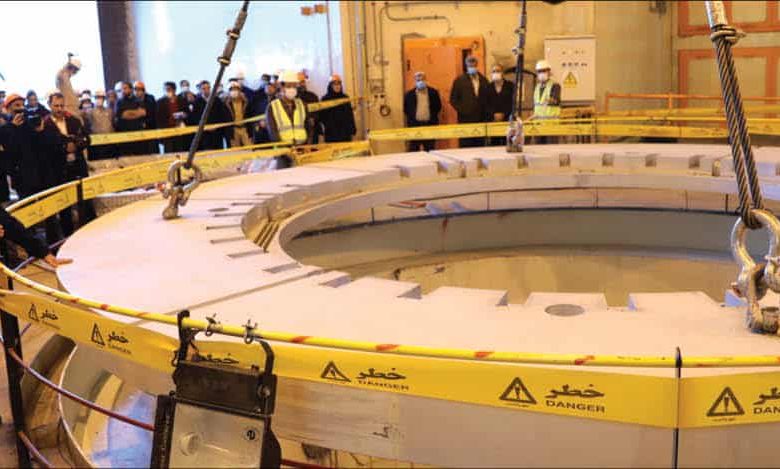Are Western Powers Finally Reaching the Limit of Patience With Iran’s Nuclear Strategy?

Arak Heavy Water Reactor Facility
Written by
Alejo Vidal Quadras
Last month, the Iranian regime offered its response to what the European Union had described as the “final text” of an agreement to revive the 2015 Iran nuclear deal and it immediately became clear that the negotiating process was nowhere near the breakthrough anticipated by the EU, the US and the three European signatories of the Joint Comprehensive Plan of Action. Tehran’s public comments on the matter explicitly revealed a desire for further changes, despite EU foreign policy chief Josep Borrell having previously stated that all opportunities for compromise had been exhausted by the previous 17 months of negotiations.
Iran’s Foreign Ministry even went so far as to predict that negotiations would open back up in Vienna and then stretch on through much of September, if not beyond. This is deeply ironic in light of the fact that the Vienna talks were previously paused for months at a time because of Tehran’s own refusal to send its representatives to the Austrian capital.
Once they did, Tehran once again seized an opportunity to prolong the gap, reiterated each of its outstanding demands, and publicly declared that Iranian negotiators would only return to Vienna in order to conclude a final agreement that reflected those demands.
Of course, no such agreement was forthcoming. And although Western policymakers have been rightly criticized in the past for appeasing the Iranian regime, no such agreement is likely to ever be achieved. Members of both political parties in the US have made it abundantly clear throughout the process that they will block any White House efforts to implement a deal that removes the IRGC’s terrorist designation. The executives in Britain, France, and Germany have faced similar pressure to at least some degree, so full-scale capitulation to Iran’s ultimatum was never a viable option, even if negotiators were willing to go that far.
Unfortunately, no one can say with certainty the Western leaders in charge of the negotiating process would not do so. The very fact that that process is still ongoing after 18 months is a testament to their excessive commitment and their excessive credulity when it comes to the Iranian regime’s intentions. Tehran continues to be treated as a good faith actor, despite a constant accumulation of evidence to the contrary.
The latest such evidence comes in the form of a new report by the International Atomic Energy Agency, which finds that Iran’s stockpile of 60-percent enriched uranium has increased at least 29 percent since May, giving the country more than enough to produce a quantity of weapons-grade uranium that is sufficient for one nuclear weapon. This only confirms what several Iranian officials, including the head of the Atomic Energy Organization of Iran, said last month: that the regime already has the technical capability it would need to become a nuclear-armed state.
Fitting a Square Peg into a Round Hole with Iran Negotiations – April 2021
Of course, Tehran has always denied that that is its intention, but Western intelligence agencies know the country’s nuclear weapons program was active at least through 2003. Nevertheless, in the context of JCPOA negotiations, Western leaders seem to take the regime at its word, even as groups like the People’s Mojahedin Organization of Iran periodically present evidence to suggest that the regime never abandoned its push for nuclear weapons, but merely moved the program underground.
The PMOI’s conclusion is strongly supported by the fact that Tehran still refuses to cooperate with a probe into the past military dimensions of its nuclear program – a probe that found nuclear traces at three undeclared sites after the JCPOA was implemented, which Tehran has ever been able to credibly explain. Now, while pushing for changes to the “final text”, Raisi is actively insisting that there is “no way forward” for the nuclear agreement unless that probe is closed in advance, arbitrarily.
Although it should not have taken so long, there are tentative signs that this latest ultimatum is finally beginning to test the limits of Western patience with Tehran’s obstructionism. Last week, the US State Department said that Iranian authorities’ latest communications regarding the “final text” were “not constructive”, and this week even Josep Borrell lamented that the two sides of the negotiating process are “diverging” instead of converging, thus leaving him “less confident” than before the final text was introduced.
Now that the Western overseers are beginning to recognize the “what” of Tehran’s behavior, it is imperative that they move on to recognizing the “why”. Far from anticipating that September negotiations would lead to a long sought-after breakthrough, it is clear that the regime is only anticipating those talks to stretch out the process even further, thereby allowing it to continue accelerating its nuclear activity without additional penalties.
This behavior cannot be allowed to continue. If it does, it will only result in the Iranian regime taking a long series of tiny steps forward until one day it takes the international community by surprise to reveal it has quietly become a nuclear-armed state. It is long past time for the US, Britain, France, and Germany to answer Iran’s ultimatums with their own. They must state the collapse of the JCPOA and impose all prior sanctions snapping back into place.

Dr. Alejo Vidal-Quadras
Alejo Vidal-Quadras, a Spanish professor of atomic and nuclear physics, was vice-president of the European Parliament from 1999 to 2014. He is currently president of the Brussels-based International Committee in Search of Justice (ISJ)

